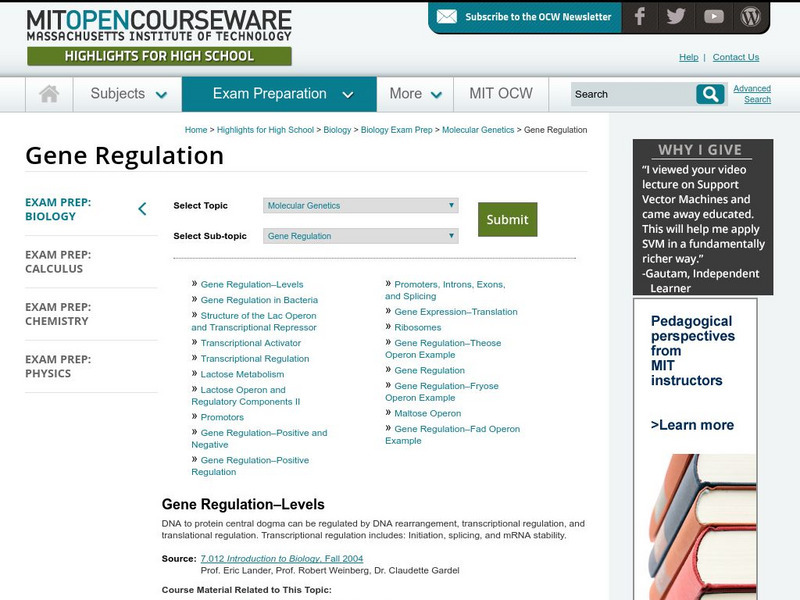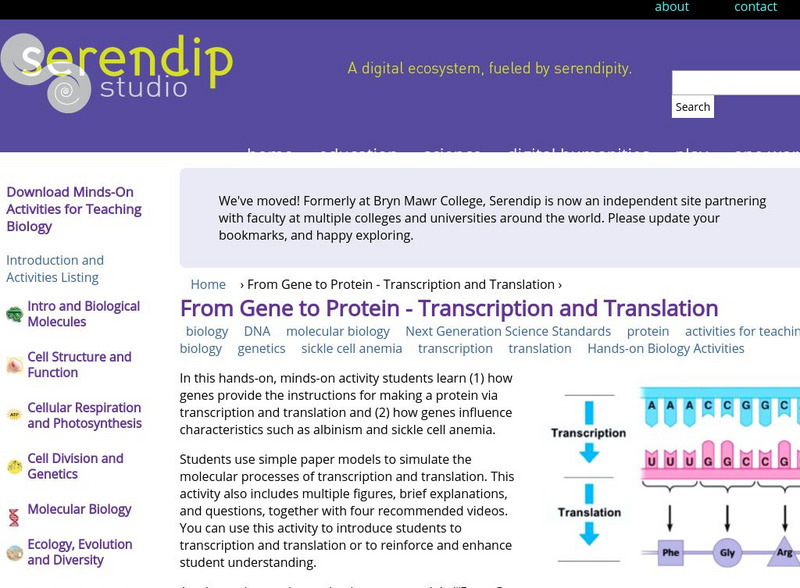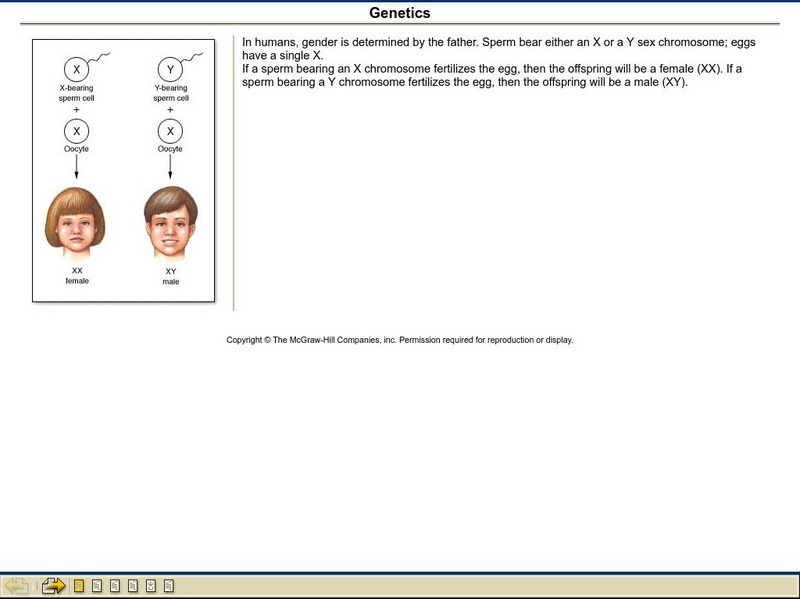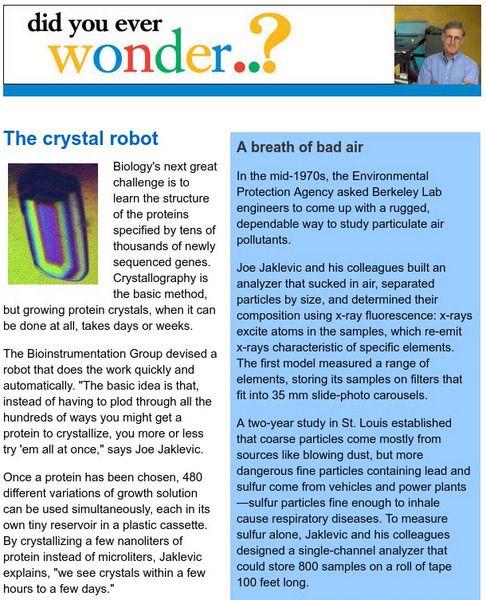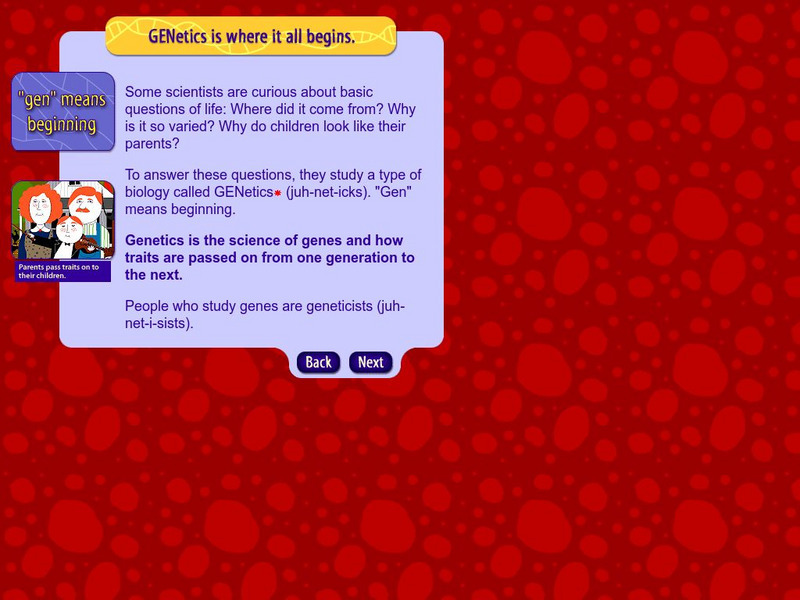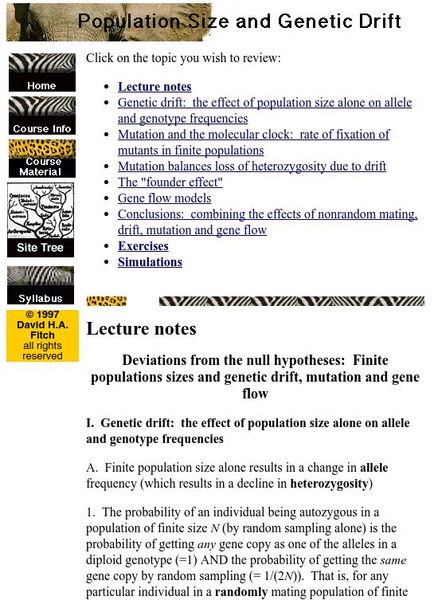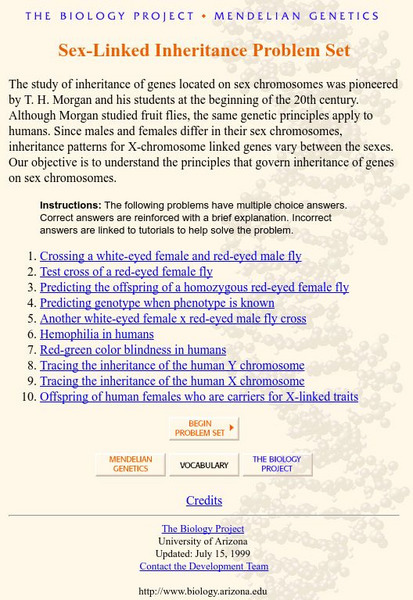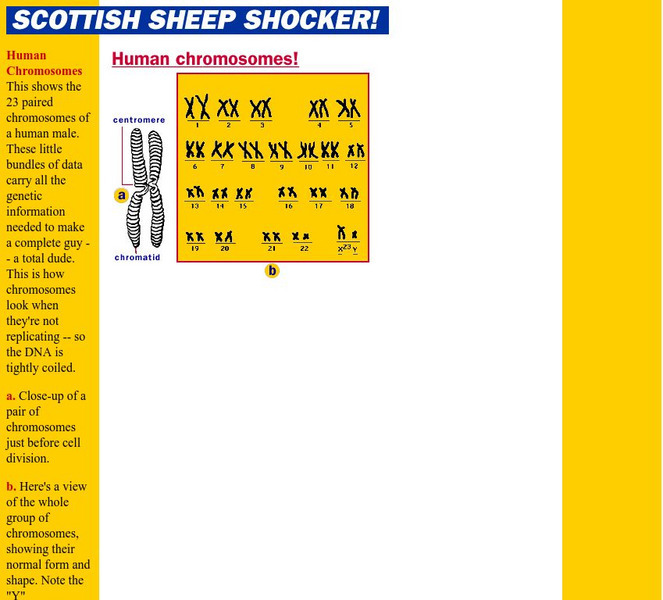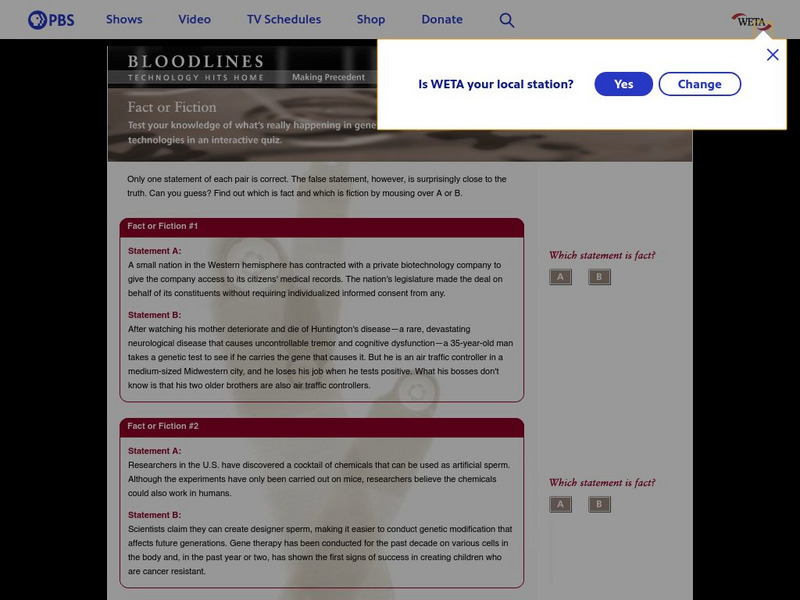Concord Consortium
Concord Consortium: Geniventure
Geniventure engages students in exploring heredity, genetics, and the protein-to-trait relationship by breeding and studying virtual dragons. Students play through six levels of challenges, conducting simulated experiments that generate...
Children's Museum
The Children's Museum of Indianapolis: Dna the Action of Extraction
Students extract DNA from wheat germ to learn about how DNA can easily be found in our food.
Science Buddies
Science Buddies: Investigate Alien Genetics
In this activity, you will use an alien model to demonstrate how genes or physical traits are passed on from parents to their offspring.
Cold Spring Harbor Laboratory
Dna From the Beginning: Classical Genetics
This article from DNA from the beginning is loaded with goodies about genetics and DNA. Starting with Mendel all the way through the concept of DNA, you will see how life is given certain characteristics. Some animations and audio clips...
Massachusetts Institute of Technology
Mit: Open Course Ware: Gene Regulation
The activity investigates gene regulation. Some topics explored are gene expression, ribosomes, promoters, and splicing. The resource consists of video clips, audio clips, practice problems, and exam questions. Practice problems and exam...
Bryn Mawr College
Serendip: From Gene to Protein Transcription and Translation
Brief text summary of what young scholars learn in the Dragon Genetics II lab along with links to download Student Handouts in PDF and Word formats, and Teacher Preparation Notes in PDF format. Students use paper models to learn...
McGraw Hill
The Mc Graw Hill Companies, Inc.: Genetics
The basic principles of genetics are in this effective site. Gender determination, recessive traits, and the Punnet Square are the topics examined. There is also a Punnet Square practice exercise to assess your comprehension of the...
Lawrence Berkeley National Laboratory
Berkeley Lab: Did You Ever Wonder? The Crystal Robot
Students examine x-ray crystallography. The resource explores the structure of the proteins specified by tens of thousands of newly sequenced genes. Additional resources are included.
National Institutes of Health
Niehs: Kids' Pages: You and Your Genes
Online children's story that teaches about genes and how they direct how you react to things in your environment. Click on "next" at the bottom of the story to see how different people respond differently to harmful substances.
Cornell University
Cornell University: Meiosis in Lily Anther Microsporocytes
This cell biology page is illustrated with photographs of plant meiosis taking place in a cell.
Cold Spring Harbor Laboratory
Dolan Dna Learning Center: Dna Molecule: How Much Dna Codes for Protein?
A quick overview of the human genome, and how much of our DNA contains genes and non-coding DNA. [1:02]
Cold Spring Harbor Laboratory
Dolan Dna Learning Center: How Alu Jumps
Animation illustrating how the jumping gene, Alu, reproduces by copying itself and inserting into new chromosomes.
McGraw Hill
Mc Graw Hill: Genes and How They Work
Discover how much you know about genes and how they work by taking this interactive quiz.
University of Arizona
University of Arizona: Developmental Mechanisms Problem Set
This interactive module introduces students to the basic concepts of development in a variety of organisms. Students will also learn about the experiments that gave scientists in the early 20th century insight into the mechanisms of...
American Museum of Natural History
American Museum of Natural History: O Logy: What's the Big Idea? Genetics
Find an overview of genetics--the science of genes--in a click-through series of short perspectives on the topic.
New York University
Population Size and Genetic Drift: Lecture Notes
This is a college level lecture on genetic drift, complete with mathmatic formulae, includes special links.
University of Arizona
University of Arizona: Sex Linked Inheritance
This site from the University of Arizona provides great information on a sex-linked inheritance problem set. This is a very good site to practice what you know about sex-linked problems. Each link is a problem.
American Institute of Biological Sciences
Action Bioscience: Species: Comparing Their Genome
Identify the significance of studying the genome of different species. Yeast, mouse, fly, and worm all contain several common genes or proteins to humans that allow for disease research.
Estrella Mountain Community College
Estrella Mountain Community College: Protein Synthesis
A look at protein synthesis in words and pictures. This website discusses the processes of replication, transcription, and translation. Also covered is Beadle and Tatum research that explains that one gene codes for one polypeptide....
University of Wisconsin
The Why Files: Scottish Sheep Shocker! New Pair of Genes
This article provides a discussion of DNA and how it replicates. Includes a chromosome map of a human male, a close-up of chromosomes just before cell division and a close up of a DNA molecule.
Beacon Learning Center
Beacon Learning Center: Where Did You Get Those Genes?
Join Professor Mill Ennium and his lab assistants as he helps Phoenix discover why he looks like a relative.
Other
Bio Ethics Education Project (Beep): Human Health
The tutorial explores human health. Topics included are genes, vaccination, health risks, and drugs in sports. The resource consists of articles,additional resources, and activities.
The Association of the British Pharmaceutical Industry
Abpi: Active Science: Genes and Inheritance
An interactive website that explores information about genes, mitosis, meiosis, cloning, and gene mutation. Concepts are discussed in detail with an interactive glossary and animations. At the end of each section quick questions are...
PBS
Pbs: Fact of Fiction
At this site from PBS you can challenge yourself with this quiz to see if you know what is true and what is false in genetic and reproductive technology. You'll be surprised by some of the things that we are currently able to do with...





